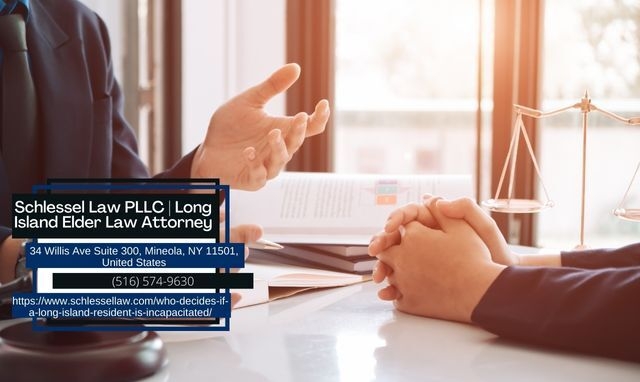New York estate planning attorney Seth Schlessel (https://www.schlessellaw.com/who-decides-if-a-long-island-resident-is-incapacitated/), founder of Schlessel Law PLLC, provides clear guidance on how incapacity is determined under New York law. When a person begins to experience difficulty with memory, decision-making, or managing day-to-day responsibilities, legal intervention may become necessary. Understanding the process for determining incapacity is critical, and a New York estate planning attorney can assist in navigating this complex area of law.
Incapacity decisions in New York are guided by Article 81 of the Mental Hygiene Law, which outlines how and when a legal guardian may be appointed. According to New York estate planning attorney Seth Schlessel, a legal proceeding begins when a family member, medical professional, social worker, or other concerned party files a guardianship petition with the court. In some cases, a judge may observe signs of incapacity during unrelated legal matters, prompting intervention. A New York estate planning attorney can help present the necessary documentation and assist in protecting the rights of the person in question.
As managing member of Schlessel Law PLLC, New York estate planning attorney Seth Schlessel emphasizes that the goal of the court is to ensure both protection and independence for individuals facing potential guardianship. The court appoints trained professionals such as psychologists, attorneys, or social workers to assess the individual’s mental, physical, and financial condition. These assessments are compiled into reports that assist the judge in determining whether a legal guardian is required. This legal standard does not depend solely on a medical diagnosis but instead focuses on the individual’s ability to manage personal care and financial matters effectively.
Under New York law, guardianship is considered only when less restrictive alternatives—such as a healthcare proxy, power of attorney, or supported decision-making—are not sufficient. This aligns with New York’s “least restrictive means” rule, which ensures the court grants only the powers necessary to protect the individual while preserving as much autonomy as possible. New York estate planning attorney Seth Schlessel outlines that guardianships can be limited to property management, personal needs, or a combination of both, depending on the specific situation.
Seth Schlessel explains the legal process in clear terms. A guardianship petition must contain evidence that the person in question is unable to meet basic needs or manage property and that this inability could lead to harm. A court evaluator interviews the alleged incapacitated person (AIP), reviews medical and financial records, and prepares a report. During a court hearing, both the petitioner and the AIP may present testimony and evidence. If the court finds “clear and convincing evidence” of incapacity, a guardian is appointed. The scope of the guardian’s authority is carefully limited to what the individual requires to remain safe and supported.
Legal guidance from a New York estate planning attorney can be essential in these cases. Seth Schlessel stresses that timely planning can reduce stress and conflict by establishing clear legal frameworks in advance. Proactive estate planning tools such as powers of attorney, living wills, and healthcare proxies can help avoid the need for court-appointed guardianship altogether.
“Trained helpers such as psychologists, social workers, or lawyers meet with you and study your situation. They write clear reports for the court, giving the judge more facts,” states Seth Schlessel, highlighting the importance of comprehensive evaluations during the legal process.
Guardianship proceedings often arise during emotionally difficult times for families. The legal process, while structured and protective, can be confusing for those unfamiliar with the system. Schlessel Law PLLC works to make sure each step is clearly explained and that all parties involved understand their rights and responsibilities. With guidance from a New York estate planning attorney like Seth Schlessel, families are better prepared to protect loved ones while honoring their preferences.
Taking early action to establish estate plans and designate trusted individuals for healthcare or financial decisions can prevent complications later. Guardianship should be a last resort when no other arrangements are in place. Seth Schlessel and Schlessel Law PLLC provide legal support that focuses on the needs of New York residents navigating incapacity concerns.
About Schlessel Law PLLC:
Schlessel Law PLLC is a New York-based law firm offering estate planning services including guardianship, elder law, and incapacity planning. Founded by New York estate planning attorney Seth Schlessel, the firm is committed to helping individuals and families create legal strategies that support autonomy, safety, and future well-being.
Embeds:
Youtube Video: https://www.youtube.com/watch?v=i3vDe2qFINI
GMB: https://www.google.com/maps?cid=7387587768064061142
Email and website
Email: seth@schlessellaw.com
Website: http://www.schlessellaw.com/
Media Contact
Company Name: Schlessel Law PLLC
Contact Person: Seth Schlessel
Email: Send Email
Phone: (516) 574-9630
Address:34 Willis Ave Suite 300
City: Mineola
State: New York 11501
Country: United States
Website: https://www.schlessellaw.com/

